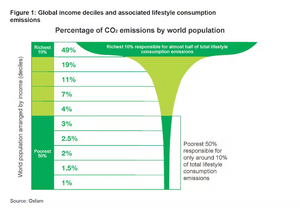Frugalism: Difference between revisions
No edit summary |
No edit summary |
||
| Line 1: | Line 1: | ||
<!-- TODO: upload [[File:energy-usage-affected-by.png|thumb|...]] | |||
--> | |||
[[File:carbon-inequality1.png|thumb|This page tells people to '''consume less stuff'''. Note that this is directed at people in '''"developed"''' countries, especially people who are middle-class or richer (i.e. the 20% of the world that uses 80% of resources). We are '''not''' telling poor people to consume less.]] | |||
'''About half''' of all [[energy]] usage is affected by '''what people buy, and how much of it.''' | '''About half''' of all [[energy]] usage is affected by '''what people buy, and how much of it.''' | ||
{{minor|<small>Pie chart will be added here soon. Mining + manufacturing + transportation of goods... adds up to half of the pie. See also: [[Why energy usage serves as a good general estimate of carbon emissions]]</small>.}} | {{minor|<small>Pie chart will be added here soon. Mining + manufacturing + transportation of goods... adds up to half of the pie.<br />See also: [[Why energy usage serves as a good general estimate of carbon emissions]]</small>.}} | ||
In this sense, we '''can''' save the planet by being '''cheap'''. | In this sense, we '''can''' save the planet by being '''cheap'''. __NOTOC__ <!-- I hid the table of contents here to help maintain readers' visual attention. --> | ||
===We can still have nice things, just replace them less often.=== | ===We can still have nice things, just replace them less often.=== | ||
{{minor|If you take a walk in a middle-class neighborhood on garbage day, you'll see the type of perfectly-good [[home waste|stuff people throw out]].}} | |||
<!-- TALK: should this be here or elsewhere? --> | |||
{{minor|If you take a walk in a middle-class neighborhood on garbage day, you'll see the type of [[home waste|stuff people throw out]].}} | |||
<!-- TALK: should | |||
====Examples==== | ====Examples==== | ||
{{empty}} | {{empty}} | ||
Revision as of 18:54, 8 September 2023

About half of all energy usage is affected by what people buy, and how much of it.
Pie chart will be added here soon. Mining + manufacturing + transportation of goods... adds up to half of the pie.
See also: Why energy usage serves as a good general estimate of carbon emissions.
In this sense, we can save the planet by being cheap.
We can still have nice things, just replace them less often.
If you take a walk in a middle-class neighborhood on garbage day, you'll see the type of perfectly-good stuff people throw out.
Examples
This section has not been filled in yet.
Analysis needed for this section: Consider various types of consumer goods, such as clothing, electronics, kitchenware, furniture etc. For each good, consider how long it could last. Then compare with the status quo of how often people actually replace it. Using the ratio between the two stats, we can calculate what percent of environmental impacts could be avoided if people chose to replace stuff less often.
Tips
This section has not been filled in yet.